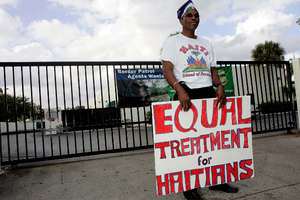End of Pandemic Medicaid Protections May Leave Many Immigrants without Health Insurance
THE TORCH: CONTENTS By Ben D’Avanzo
February 7, 2023
Millions of people who receive health care through Medicaid will have their eligibility reviewed for the first time in over three years. Medicaid eligibility review, or ”redetermination” normally takes place at least once a year but was suspended due to policies related to the COVID-19 pandemic.
The redetermination process will disproportionately put immigrants and their families at risk of losing health coverage unnecessarily, because they face unique barriers to maintaining coverage. These barriers include the additional application steps required to verify their immigration status, challenges with identity verification, and household composition issues such as living in multi-generational families. Policymakers must go beyond current practices to ensure that immigrants retain health coverage through Medicaid or make a successful transition to the Affordable Care Act marketplaces. Here’s how:
Simplify Enrollment as Much as Possible – Determining Medicaid eligibility is complicated for both applicants and eligibility workers. This complexity is compounded for immigrants, who are required to demonstrate satisfactory immigration status and often encounter challenges in verifying their identities. Many immigrants, such as those working in seasonal or unstable jobs, also have difficulty verifying their income. States are required to redetermine applications without the recipients’ involvement, when possible, known as “ex parte” redetermination. States should seek out additional sources of information they can use in making ex parte redeterminations, such as information held by other state benefits agencies. States should accept applicants’ self-declaration of income that they can verify independently, such as income, and allow for reasonable variances.
Ensure Medicaid Eligibility Workers are Trained on Immigrant Eligibility – The rules that govern immigrants’ eligibility for Medicaid are complicated, with variations by immigration status, time spent in the U.S., age, pregnancy and beyond. There have also been recent changes, for example, people living in the U.S. under the Compact of Free Association became eligible since Medicaid redeterminations were last conducted, as well as some Afghan and Ukrainian parolees. Medicaid agencies should ensure their staff receive regular training on immigrant eligibility to ensure no one is improperly denied coverage.
Conduct Outreach and Enrollment in Multiple Languages – Current Medicaid practices consistently fail people with limited English proficiency (LEP), despite the prevalence of LEP individuals in Medicaid households being more than double those of non-Medicaid households. For example, many states provide applications in English only, and very few translate their applications into languages beyond Spanish. State Medicaid agencies, which are responsible for ensuring meaningful access to their programs for people with LEP under Title VI of the Civil Rights Act of 1964 and Section 1557 of the Affordable Care Act, should, to the extent possible, communicate with applicants in their preferred language at all points in the process.
Without in-language applications, outreach and notices, LEP households may fail to realize they need to update their information with their Medicaid agency before losing coverage. The Centers for Medicare & Medicaid Services (CMS) suggests that states review their language access plans and review the availability of interpreters, among other steps, and currently offers toolkits in Spanish, Chinese, Hindi, Korean, Tagalog, and Vietnamese. California offers its applications in 12 languages. While Virginia only offers applications in Spanish, the state has programmed its systems to translate notices into several other languages. Given that many people with LEP prefer oral interactions, states may also want to follow the example of Oregon, which offers specific phone lines for different languages. State Medicaid agencies should use the opportunity of the unwinding to take the next available step towards greater language access in their application process.
Utilize All Forms of Communication – The Consolidated Appropriations Act, 2023 requires states to attempt to reach beneficiaries at risk of disenrollment with more than one method of communication. States should consider going beyond this requirement by attempting to contact people using all available forms of communication. For immigrants, particularly migrant workers or humanitarian immigrants who may move from where they were originally resettled to be closer to family, geographic movement is common. As a result, mailing addresses and phone numbers may have become outdated since their last redetermination over three years ago.
Nonetheless, postal mail remains an important form of communication and the way in which beneficiaries expect to receive notices from state agencies. States should act affirmatively to obtain change of address information through postal databases to supplement beneficiary updates.
Utilize and Fund Trusted Community Institutions – In addition to the challenges described above, agency communication with immigrant households is often hampered by their distrust of government. Concerns about interacting with government agencies or the consequences of receiving benefits may cause recipients to discard or ignore government communications. Agencies should proactively convene community-based organizations, schools, health clinics, non-English language media, and influencers on social media apps, like WhatsApp and WeChat, that are commonly used by immigrants. For example, California has created a Coverage Ambassadors campaign. Agencies should also recognize that community-based organizations are often under-resourced and should provide financial support for their participation in the redetermination process.
Assure Immigrants About Their Protections and Privacy – Some immigrants may be concerned about sharing the personal information needed to redetermine their eligibility, particularly if they have family or household members who are concerned about immigration enforcement. The time gap since redeterminations last occurred may have led to eroded trust. Families may act with suspicion or uncertainty when presented with the need to respond to a government notice. Medicaid agencies and other entities engaged in outreach can adopt trusting community approaches and welcoming policies to help educate applicants about how their data will and will not be used. They should also proactively address immigration status–related concerns like public charge.
Overall, states will have up to a little over a year to conduct these redeterminations. Without careful planning, including proactive, intentional steps like those outlined above and in more detail through the Protecting Immigrant Families network toolkit, more immigrant families will lose health coverage. Instead of defaulting to usual practices, policymakers should view this restart of renewals as an opportunity to make improvements to their Medicaid outreach and enrollment practices to promote health equity. Otherwise, parents may arrive at their children’s pediatrician’s appointments only to find, through no fault of their own, they are now uninsured.
Ben D’Avanzo is a Senior Health Policy Analyst at NILC.










